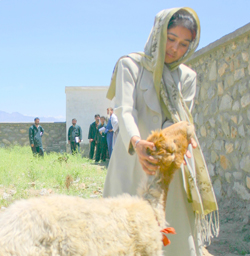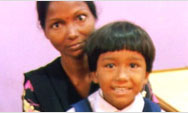You are here » Home » Telling Our Story
Success Story
Improving livestock health through para-veterinary training
Afghanistan Gets First Female Para-Vet

| |
Photo: USAID/Jeremy Foster
|
|
Fareba Miriam inspects sheep at a veterinary training clinic in Charikar, Parwan.
“Women are largely responsible for tending to animals in Afghanistan. There really is a need for women veterinarians to work with them,” Fareba Mariam, a para-veterinarian trainee.
|
In March 2006, Fareba Miriam became the first woman to enroll in a para-veterinarian training program that USAID is running in Afghanistan. She learned about the training opportunity while teaching geography at a high school in Feyzabad, Badakshan, a northern province of Afghanistan. Fareba is 26, the eldest daughter in a family of 12. Although her family does not raise livestock, many members of her community are dependent on healthy herds and flocks to maintain their livelihoods.
Fareba is attending the para-vet program for six months at one of the training centers, which are located in Parwan, Hirat, and Balkh provinces. Participants attend classes in pharmacology, nutrition, disease identification, anatomy, and pathology, and receive practical training at rural veterinary clinics. Business management courses that prepare the para-vets to manage veterinary field units are also integral to the program. When Fareba graduates she will return home, where she plans to open a veterinary field unit. She recognizes that many women in Afghanistan are responsible for raising animals and that a veterinary unit run by a woman would benefit her community.
A USAID program that is helping rebuild agricultural markets in Afghanistan will provide Fareba with equipment, furniture, and start-up capital to help her establish a field unit. The para-vets deliver a range of veterinary services, including conducting diagnostics, delivering vaccinations, and performing basic surgery on livestock and poultry in rural communities. Operating as a small business will give Fareba and other para-vets a chance to generate income to help support their families while providing a valuable service to their communities.
Responding to the need to improve livestock health and reduce mortality rates, USAID has established 386 veterinary field units in 31 provinces throughout Afghanistan.
Print-friendly version of this page (440kb - PDF)
Click here for high-res photo
Back to Top ^ | 

